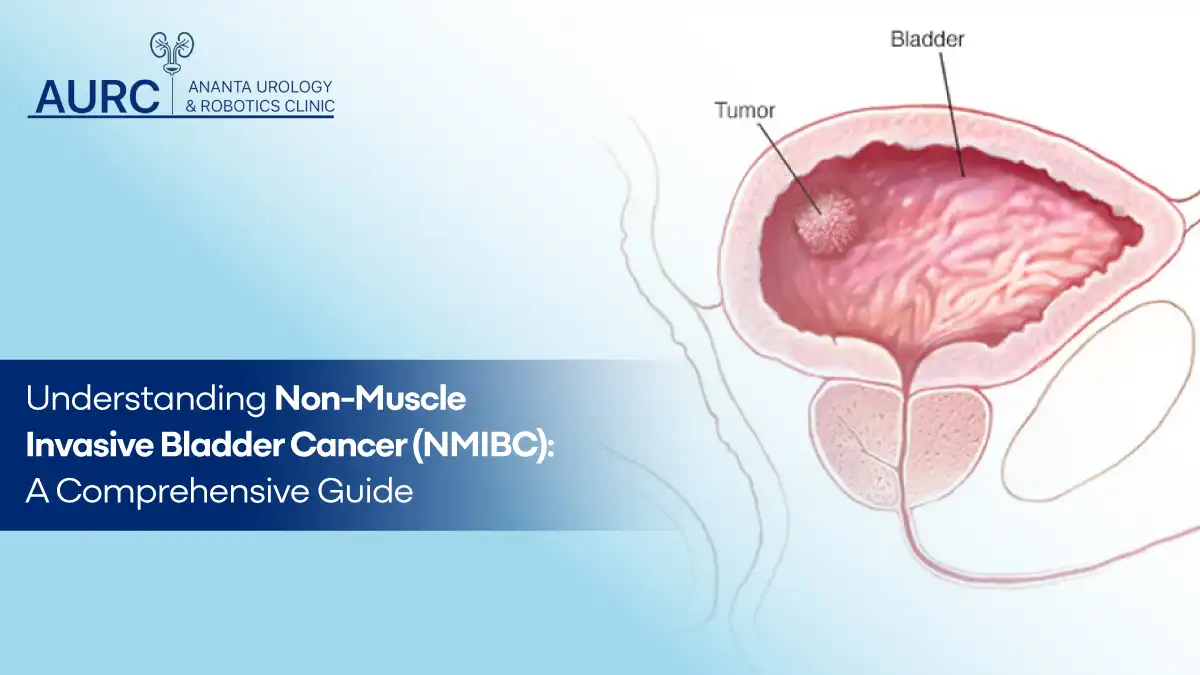Understanding Non-Muscle Invasive Bladder Cancer (NMIBC): A Comprehensive Guide to Treatment and Management
Non-Muscle Invasive Bladder Cancer (NMIBC) is a complex condition that requires both timely treatment and diligent long-term management from a urooncologist. While NMIBC is generally less aggressive than muscle-invasive forms of bladder cancer, it poses unique challenges due to its high recurrence rate and potential to progress into a more serious form of cancer. Whether you've recently been diagnosed or are seeking more information, understanding the steps involved in managing NMIBC is crucial.

The Basics of Non-Muscle Invasive Bladder Cancer
NMIBC is a type of bladder cancer that remains confined to the inner layers of the bladder wall without invading the muscle layer. This characteristic often makes it more treatable but also requires vigilant monitoring to prevent recurrence or progression.
Low-Grade vs. High-Grade NMIBC: What’s the Difference?
One of the most important factors in managing NMIBC is understanding whether the cancer is classified as low-grade or high-grade.
1. Low-Grade NMIBC :
- Characteristics : Low-grade NMIBC typically grows slowly and is less likely to invade deeper layers of the bladder or spread to other parts of the body.
- Treatment : While it has a lower risk of progression, low-grade NMIBC still requires treatment and monitoring. TURBT is often sufficient, followed by intravesical chemotherapy to reduce the risk of recurrence.
5 Key Steps in Managing NMIBC
Transurethral Resection of Bladder Tumor (TURBT) :
- What It Is : TURBT is the primary treatment for NMIBC, involving the removal of abnormal bladder tissue using a special scope inserted through the urethra.
- Why It Matters : This procedure not only helps in removing visible tumors but also provides tissue samples for determining the cancer's grade, which is critical for planning further treatment.
Intravesical Therapy
- What It Is : Following TURBT, intravesical therapy involves delivering medication directly into the bladder to eliminate any remaining cancer cells.
- Options Available :
- § BCG Immunotherapy : Often recommended for high-grade NMIBC, BCG stimulates the immune system to fight off cancer cells.
- § Intravesical Chemotherapy : Typically used for low-grade NMIBC, this treatment targets residual cancer cells that might not have been removed during TURBT.
Regular Follow-Up with Cystoscopy :
- What It Is : Cystoscopy is a procedure where a thin tube with a camera is inserted into the bladder to monitor for recurrence.
- Why It's Crucial : Given NMIBC's high recurrence rate, regular cystoscopies (every 3-6 months initially) are essential to catch any returning cancer early.
Healthy Lifestyle Changes :
- What to Focus On : Quit smoking, maintain a balanced diet, and stay hydrated to support bladder health.
- The Impact : These lifestyle modifications can reduce the risk of recurrence and enhance your overall well-being.
Recognizing Symptoms Early :
- Key Symptoms to Watch For : Blood in the urine, frequent urination, pain during urination, or pelvic discomfort.
- Action to Take : If you experience any of these symptoms, seek prompt evaluation by a urologist to rule out recurrence.
Why TURBT is the Cornerstone of NMIBC Treatment
TURBT is the first and most critical step in managing NMIBC. It serves a dual purpose: removing the tumor and providing crucial information about the cancer’s grade and stage. This information guides the next steps in treatment, such as whether intravesical therapy is needed. Without TURBT, it's impossible to accurately assess the extent of the disease or plan effective follow-up care.
The Role of Intravesical Therapy in Preventing Recurrence
While TURBT can be highly effective, NMIBC has a tendency to return. That’s where intravesical therapy comes into play. By directly targeting the bladder, treatments like BCG immunotherapy and intravesical chemotherapy help reduce the risk of recurrence. The choice between these therapies depends on whether the cancer is high-grade or low-grade, and your urologist will tailor the treatment plan to your specific situation.
Importance of Regular Follow-Up and Cystoscopy
Cystoscopy is the gold standard for monitoring NMIBC after initial treatment. The procedure involves using a scope to look inside the bladder for any new tumors. Regular follow-up is essential because NMIBC can recur even after successful treatment. Early detection of recurrence through cystoscopy allows for prompt intervention, which could mean the difference between a minor procedure and more invasive treatments like cystectomy.
Lifestyle Changes to Support Long-Term Health
Your lifestyle choices play a significant role in managing NMIBC. Smoking is a well-known risk factor for bladder cancer, and quitting can significantly reduce the chances of recurrence. Additionally, maintaining a healthy diet, staying hydrated, and avoiding exposure to harmful chemicals can support your long-term bladder health. Regular exercise and stress management also contribute to overall well-being, making it easier to cope with the demands of ongoing treatment and follow-up care.
Recognizing and Responding to Symptoms
Even with the best treatment and follow-up care, it’s crucial to remain vigilant for any signs that could indicate a recurrence. Symptoms like blood in the urine (hematuria), frequent urination, pain during urination, or pelvic discomfort should never be ignored. These could be early indicators that the cancer has returned or progressed. Prompt evaluation by a urologist is critical if any of these symptoms appear.
Your Next Steps: Taking Control of Your Bladder Health
If you or a loved one is facing NMIBC, proactive management and consultation with an urooncologist who is expert in bladder cancer treatment is key. Dr. Rohan Patel one of the best urooncologist and robotic surgeon in Ahmedabad, India; is a specialist in bladder cancer treatment in India with an experience of more than 15 years.
From initial diagnosis and TURBT to ongoing follow-up and lifestyle advice, Dr. Rohan Patel ensures bladder cancer patients are well-supported at every stage of their journey.
Don’t wait for symptoms to worsen. Take control of your bladder health by Scheduling an Appointment with Dr. Rohan Patel today.
Call us now or Visit our Website to book an appointment. Your journey towards better bladder health starts here.

